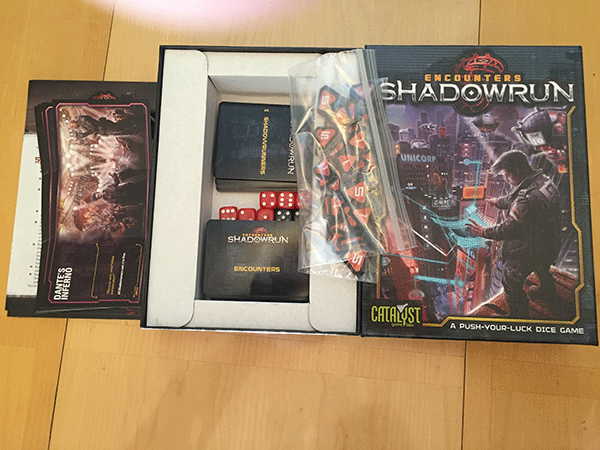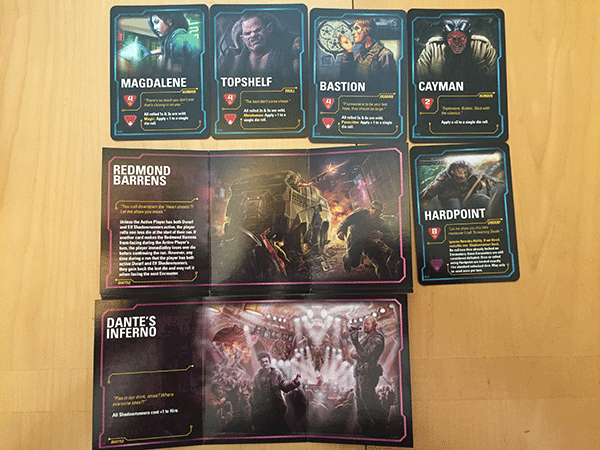Encounters: Shadowrun Review
on Sep 8, 2016
As a huge fan of Shadowrun I’m sad to say that not only was I fairly disappointed that the classic RPG setting is only marginally integral to the Encounters: Shadowrun mechanics, but the game also has some significant issues. In my first two plays of the game, one of the opponents completely ignored all the options available to her regarding special powers, which allow the use of cards to help her rolls, and completely destroyed the rest of us, who were playing the game “as designedâ€. She didn’t roll particularly well, or get particularly lucky with cards, so we assumed it was simply a fluke, despite beating the tar out of the rest of the players by no less than 27 points in a 30 point match. Then she did it again, the same way, but with a 30 point margin.

Play revolves around players going through a series of adventures in the Shadowrun universe, which expressed as singular “encounter†cards with a target value and that are resolved by die rolls. For example, if the first encounter of your turn has a “9†on it, you must roll six dice and be able to exactly have that value in order to continue. Dice you use to hit the target number are locked, and you then either choose to stop and score, or take a risk a new encounter; if you continue, you re-roll the unlocked dice and try to do the same thing with the new encounter card. If you end up using up all of your dice, you can start a new column, where the scores for all cards in that column are doubled, and so on. If you fail, you can either discard a Runner card to clear off the table, or pass and the next player gets to start from where you left off, all but guaranteeing some free Nuyen, which is both the currency in the game as well as victory points.
It’s a very simple push-your-luck game, but there’s some twists: you start with one Runner card, which you can use to augment your rolls, but once you’ve used it, you have to pay three Nuyen to retain them for use later or you lose the card. It’s not that big a hit, though, because you can buy a new card prior to taking on any encounter, and the cost is generally two to three Nuyen each. Now, to complicate things, there’s a global effect that changes often but that’s always in play; it’s generally not a good thing for the player. You may ignore it by turning a Runner card face down for the turn, though, if you have one. Finally, every player is initially issued a Corporation card which has a special power that can be used to mess with the active player for a small Nuyen fee, but only one opponent can use it per turn, though, so you end up consulting one another in order to decide whose power is the most useful. That’s all there is to the game.

Now I’m coming full circle back to my original point: with all of these little options that allow you extend your turn or mess with other players, in the three initial games we played, the same one opponent completely ignored all of it and beat the tar out of the rest of us by an absurd margin. Because you start with a pittance of Nuyen, players start the game with almost no options but to go for encounters and try to gain some Nuyen to have more options in future turns.
Unfortunately, the return on investment for buying and using Runners is generally not that hot, so while the rest of us were using cards and dirty tricks to hurt her and extend our turns, but it almost always ended up that we were taking two steps forward and one back, or we pushed our luck just a little too far and got hosed, giving the next player the opportunity to score big on the shoulders of our own efforts and monetary outlay.
If that happened once, I’d call it a fluke. But two times, back to back, we got trounced, and the third time we still ended up losing, albeit by a slightly smaller margin. What I’ve determined is that if everyone is playing using cards, it works pretty well, but if one player simply ignores the cards, the rest of the players must follow suit or be faced with the very real prospect of a crushing defeat. Granted, luck does have a lot to do with this game, not just due to the dice, but also by what encounters emerge and when. But still, when you can choose to play game as designed with special rules and chrome for lesser results or just playing it like a bare-bones Yahtzee game and winning, it seems like there’s a problem with the design.
Now, I’d argue that the game is actually pretty fun for what it is, despite the setting being very thinly applied to the mechanics. We had a good time playing it, even though we were a little irritated that playing with the cards and powers is ultimately optional. It was certainly frustrating to watch someone ignore the cards and win three times, back to back, but with such a short play time we really didn’t feel invested enough to care all that much. I just wish the game had come with custom dice, had a little more “meat†to it, and had a far more integrated Shadowrun setting.

 Customer Support
Customer Support  Subscribe
Subscribe 




 Account
Account  Wishlist
Wishlist 
